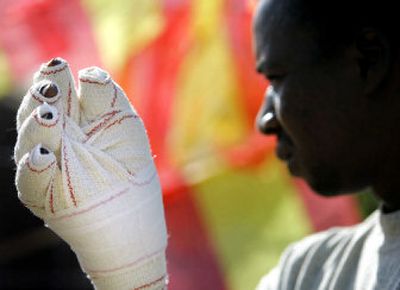Spain battles waves of would-be refugees

MELILLA, Spain – It would look like a game of cat-and-mouse but for the desperation fueling it. Hiding themselves by day in hillside caves to escape Moroccan police, emerging at night to eat from garbage bins, hundreds of African men prepared to make their break for Spain.
In their way were two 10-foot razor-wire fences that separated Morocco from a tiny Spanish enclave providing a toehold in Europe – and an end of months of misery living in the bush. On the other side of the twin barriers, Spanish police were poised with guns, truncheons and motion detectors to keep them out.
“There were police everywhere,” said Sekou Bokoum, a 28-year-old from Mali. “The main thing was to have courage. It was courage that pushed us over the fence.”
Up and over they went, scaling rickety ladders made from tree branches. Two groups – each estimated at 500 men – rushed the frontier Tuesday in the latest and largest of a series of human waves bound for Spain after months-long journeys from some of Africa’s poorest countries.
An estimated 300 made it through in a chaotic clash with overwhelmed Spanish officers – a surge that, along with the death of five immigrants Thursday at another enclave, Ceuta – prompted Spain to call out army troops on the border. The human wave also gnarled ties between Spain and Morocco, two neighbors that have long quarreled over fishing rights, illegal immigration and sovereignty over the enclaves themselves.
In Melilla, sirens blared in the night. Men screamed as they jumped from the top of the second, innermost fence, cutting themselves on the razor wire or breaking limbs. Police on motorcycles rode through the melee.
“After we got over the fence, we just ran. We ran without stopping,” Bokoum said. “We thought we were going to end up back in the forest.”
He held out his hands to show gashes from the razor wire. Like many others, he ran into the city and simply surrendered to police.
Bokoum and others housed at a sun-baked, overflowing holding facility outside Melilla do not know what awaits them now, but say anything is better than living in the pine forest that was their crude home as they tried to dodge baton-wielding Moroccan police bent on expelling them to Algeria, the entry point for most.
“By day, we’d hide in caves,” said Robert Zambo, a soft-spoken 23-year-old from Gabon. “Only at night were we free.”
Their diet consisted mainly of bread bought from Moroccan villagers and whatever they could scrounge from trash cans.
The new arrivals will stay in legal limbo because many come from destitute countries that lack automatic repatriation agreements with Spain and refuse to reclaim the would-be immigrants.